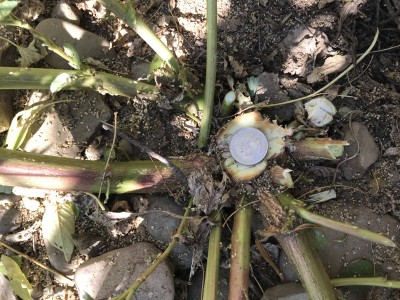Preventing the Spread of Troublesome Weeds at Harvest in Southwest New York
Joshua Putman, Field Crops and Forage Specialist
Southwest New York Dairy, Livestock and Field Crops Program

-Article information adapted from PennState Extension written by Dr. John Wallace and Heidi Reed-
Resistant weeds cause significant yield loss, increased production costs, and are becoming a bigger problem every year in New York. Farmers rarely proactively manage weeds to prevent or delay selection for herbicide resistance. They usually increase the adoption of integrated weed management practices only after herbicide resistance has occurred. Our most problematic herbicide-resistant weeds, like horseweed (marestail), waterhemp, and Palmer amaranth, can easily spread from one field, or one farm, to the next, as seeds get trapped in/on tillage, planting, and harvest equipment and ride field-to-field this time of year.
It is important to be proactive to prevent the spread of seed. You should have a plan going into the harvest season, including the appropriate order to harvest fields and equipment-cleaning protocols. GROW (Get Rid Of Weeds), a publicly-led network that provides resources and tools for implementing integrated weed management, suggests a few ways to prevent the spread of weeds with equipment:
· Scout fields before harvest, and identify which fields have problematic weed species;
· Harvest and/or till herbicide-resistant weed-infested fields, or portions of fields, last;
· If the combine or tillage equipment entering a field has recently been in a field with herbicide-resistant weeds, clean the equipment prior to entering the field, or use different equipment if it is available;
· Carefully and completely clean used equipment upon purchase;
¨ Start cleaning the combine from the top and moving from the header backward
· Use an air compressor to remove as many weed seeds from the combine as possible, including the rock trap, grain auger, and tailings processor;
· Deep clean the combine following the Straw Bale Methodology when moving from fields infested with herbicide-resistant weeds, and at the end of the year.
Once harvested, fields should not be abandoned until next spring. Marestail, a winter annual weed, will thrive in the fall after corn or soybean harvest; fall burndown in marestail-infested fields is essential. Although waterhemp and Palmer are summer annuals, they can still potentially set seed with favorable weather late in the fall. It is important to continue to scout fields and clean equipment to prevent serious management challenges in the future. For details, contact Josh Putman.
Upcoming Events
WNY Pastureland Conversion & Soil Health Field Day
July 16, 2025
Middleport, NY
Join American Farmland Trust for the Western New York Soil Health Field Day on July 16, 2025, at Zeliff Farm in Middleport, NY, from 9:00 AM-3:15 PM. Learn about pasture conversion, soil health benchmarking, biochar in grazing systems, and best grazing practices. Plus, enjoy hands-on demos with the NY Soil Health Trailer, drones, and cover crops! Check out the attached agenda for more information about the field day and REGISTER HERE. Zeliff Farms is a regenerative beef operation who has recently partnered with AFT on outreach and education to farmers including learning circles and evaluating biochar effects on soil health.
IPM Strategies to Protect Corn and Soybean Seed in NY
July 30, 2025
Hamburg , NY
SWNYDLFC and Cornell IPM are hosting a grower meeting to discuss integrated pest management strategies for protecting corn and soybean seed in New York.
FAMACHA Training for Sheep and Goat producers in Woodhull NY
August 13, 2025 : FAMACHA Training in Woodhull
Woodhull, NY
Join us for a discussion and hands-on training for internal parasite integrated pest management in sheep and goats. Certification is available to all students participating in the workshop.
Announcements
No announcements at this time.





